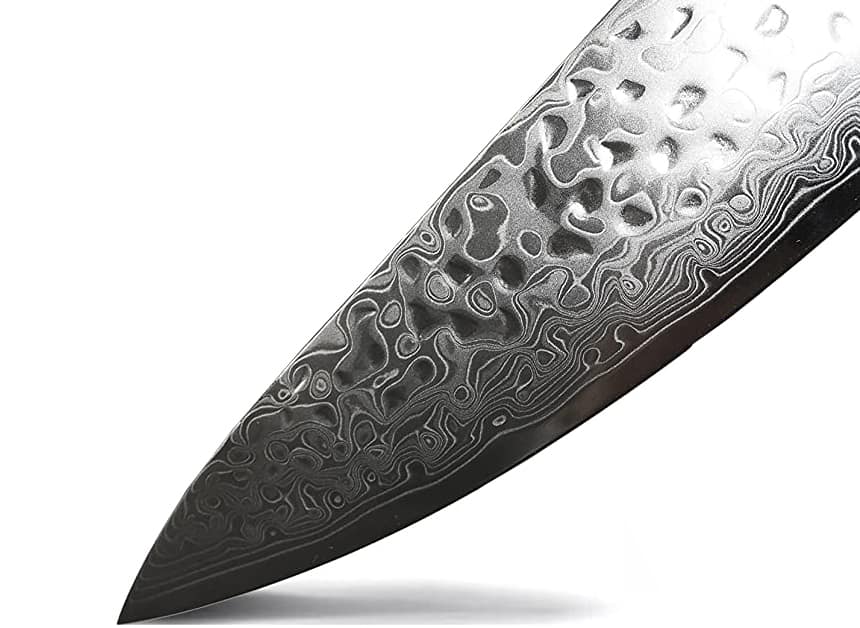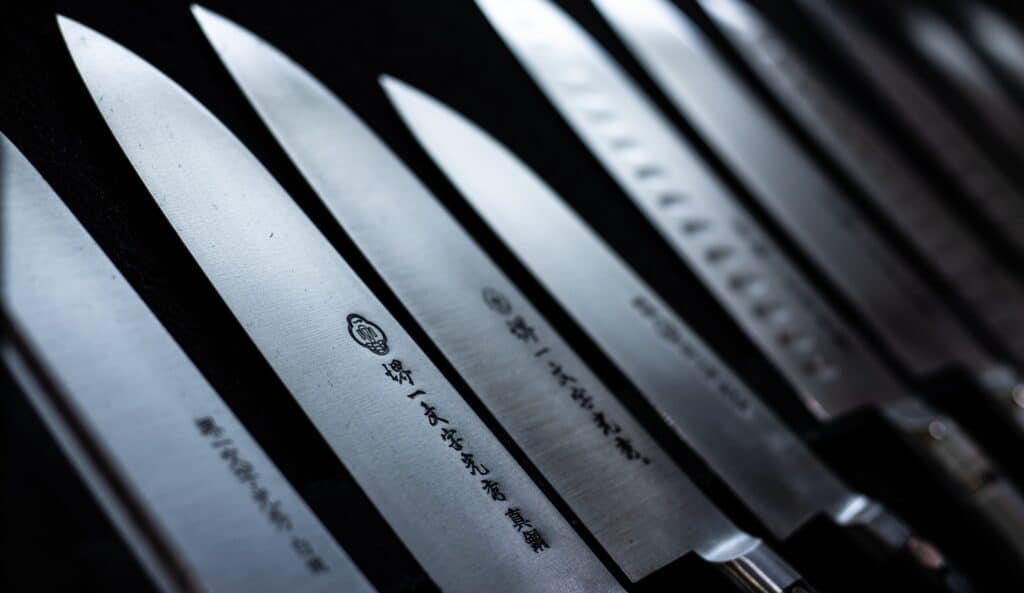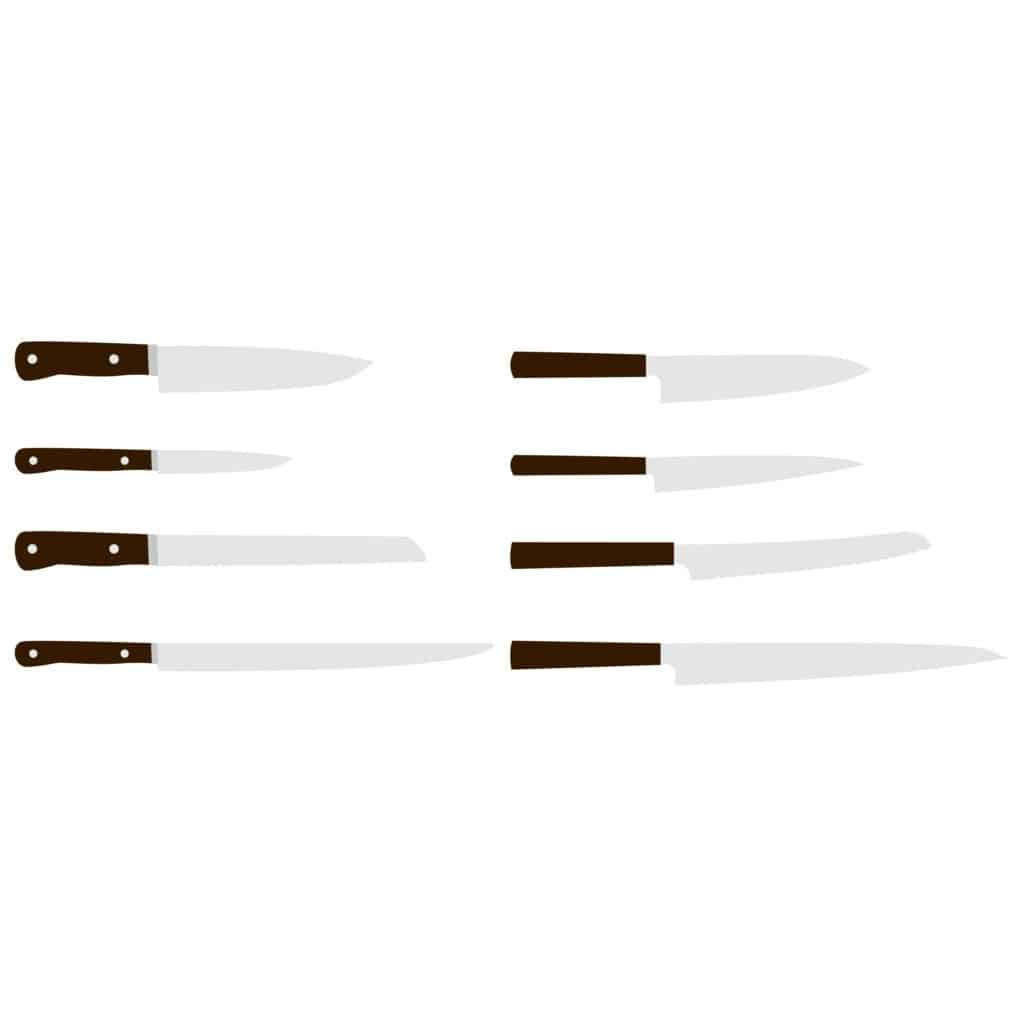
Damascus steel has a long and rich history. It’s a steel surrounded by mythology and its unique appearance only adds to its legend.
Damascus steel gains its name from the Syrian capital, Damascus. The true name of the steel is actually wootz steel; however, It’s through the city of Damascus that wootz blades were traded to the west and hence it became known as Damascus steel.
Famed for its strength and beautiful design, Damascus remains a highly sought after steel today.
In this article I’m going to run through whether Damascus steel is really as good as its reputation would have you believe, I’ll answer some frequently asked questions about Damascus steel and I’ll give some of my recommendations for quality Damascus kitchen knives.
This article will focus on comparing Damascus steel to other steel types used for kitchen knives, if you want a full and detailed look into the specific properties of Damascus steel, like how strong it is and its different textures, then check out my *Damascus Steel Properties* article as well.
Is Damascus Steel Good
Let’s cut right to the chase and answer the most frequently asked questions about Damascus steel, is it actually any good for kitchen knives?
Damascus steel is a great steel for kitchen knives. Damascus steel is hard, allowing for a finer, sharp edge. The layering of two steel types also allows one softer steel to be introduced, increasing the flexibility of the knife and thus making it more durable.
I’m not going deep into the details of Damascus steel forging techniques in this article, but if you are interested I do provide an in-depth view *here*.
What is important is understanding the basic principle of what makes Damascus good, and why it makes particularly good steel for kitchen knives. Damascus steel is made by layering two different steel types one on top of the other multiple times.
The steel is then heated until it’s glowing orange and can be worked, it’s hammered together to create a single block and then folded over itself.
That’s why you get that thin wave-like pattern on the finished blade, each wavy line is one layer of the steel and since two different steel types are used you can still see the distinction between each one.
The reason why this technique makes Damascus steel good is that the idea of layering two steels is that you layer two steels with different properties. One steel will typically be a softer, more flexible steel and the other will be a harder, more brittle steel.
Layering and then forging them together gives the resulting Damascus steel qualities of both, leaving you with a steel that has enough strength that it can be used to forge a super sharp knife edge, and enough flexibility to stop that edge from chipping or cracking.
There is of course an added bonus. The layering technique of Damascus steel gives it its intrinsic beauty, the wave-like patterns which are often the main reason people are drawn to Damascus knives. But underneath all that beauty, Damascus steel forging is fundamentally a very good way of making quality steel, with the properties of both hardness and flexibility.
How Good is Damascus Steel
So, Damascus steel is good, that’s pretty hard to argue against, but exactly how good is Damascus steel when we compare it to other steel types?
How good Damascus steel is depends on the base steels which are used to make it. There are no strict rules on which steel can be used as Damascus is more of a forging technique than a steel type; therefore, when looking at buying a Damascus knife, you should also check that a quality steel has been used.
Here is a list of common steel types used for forging Damascus steel. All of these are quality steel and will result in a hard blade:
Good Steel for Damascus Knives
- AUS8
- AUS10
- VG1
- VG2
- VG10
- VGMAX (Only with Shun knives)
This is not a comprehensive list of all the good-quality steels that could be used for forging Damascus, but it will cover the vast majority of widely available knives.
There are some other quick checks you can make to ensure the quality of a Damascus steel knife:
- The Price – Real Damascus is not cheap, any ‘Damascus’ knife under $100 (unless it’s a small paring knife or similar) should raise a red flag. It either uses very cheap base steel, or it’s not Damascus at all, a similar wave effect can often be printed onto the blades of cheap fake-Damascus knives.
- Where It’s Made – Most real Damascus knives are made in Japan. This isn’t always the case, there are good brands like Zelite and Dalstrong which produce real Damascus knives in China, but not being made in Japan is definitely a good warning signal. An 8-Inch knife under $100 and not made in Japan is very likely to be either poor quality or fake.
If you know a Damascus knife is made using quality base steel then it will be a very good knife. Damascus steel will generally be stronger than regular steel, that is; the same type of steel you would find used for most normal knives. Normal knives usually use more flexible steel, since Damascus forging allows for a combination of flexibility and hardness in the steel then Damascus knives are generally harder than knives that use normal steel.
So Damascus steel is good. But is Damascus steel the best steel you can use for kitchen knives? To answer that, let’s look at some common steel types you’ll find and see how Damascus blades compare.
Damascus Steel vs Carbon Steel
In general, high carbon knives will provide a sharper edge, with better edge retention. A Damascus knife will give you a better balance of hardness and flexibility, making them more durable.
This however, is a very general rule and it would be foolish indeed to apply it to all carbon and Damascus knives. Most Damascus knives will also have high carbon content, so you could quite reasonably claim that most Damascus knives are also high carbon steel knives.
More important than simply looking at the description of a knife is to understand the actual steel used. Once you know what the steel used you can get a much better understanding of the carbon content.
I would consider a knife with a carbon content of around 1% or more as a high carbon knife. Some companies market their knives as ‘high carbon’ with as little as 0.5% carbon content, I think this is misleading and since there are no regulations on what is truly considered high-carbon many companies just say whatever they want.
I think that to get the full benefit of high carbon knives the carbon content needs to be near the 1% mark at least. So if you see a Damascus knife you like the look of, find out what steel it uses and then check the composition of that steel.
ZKnives.com (opens new tab) provide a great resource for checking steel composition. For example, type in AUS10 to the search bar on there and you’ll see it has a Carbon (C) content of between 0.95 and 1.10, so you can class that as a high carbon steel.
Damascus Steel vs Stainless Steel
Good quality stainless steel knives are generally more durable than Damascus knives. However; Damascus knives are usually stainless anyway. Western-style stainless steel knives generally focus on durability whilst Damascus knives balance durability and strength, allowing for a sharper edge.
Stainless is an attribute given to any steel which has a high enough Chromium content. The higher the Chromium content the better the stainless steel, that’s because Chromium is the element that prevents steel from rusting. For the budding chemists amongst you, stainless still achieves this anti-rust quality as Chromium reacts with oxygen to create chromium oxide, this reaction occurs more quickly than iron oxide (which is the cause of rust) can form, and as a result the blade forms a protective layer of chromium oxide.
Steel can be called stainless with just a 10.5% Chromium content, but I would consider anything below 13% to be poor. Most high-quality stainless steel knife brands like ZWILLING and Wüsthof have a Chromium content of around 15%.
Damascus knives usually have a pretty good Chromium content themselves and so most Damascus knives you’ll find will themselves be stainless. If in doubt, find out what steel the Damascus is made from and look it up here ZKnives.com (opens new tab), check the Cr level and then reference against this table. Most decent Damascus knives will be in the medium to high-quality stainless steel range anyway.
| Category | Chromium content |
| High-Quality Stainless Steel | > 14% |
| Medium-Quality Stainless Steel | 13%-14% |
| Low-Quality Stainless Steel | <13%(<10.5% is not stainless steel) |
What actually makes many stainless steel knives more durable than Damascus is their lower Carbon content. Those western-style brands like ZWILLING and Wüsthof usually have a Carbon content of around 0.5%, far lower than the commonly high Carbon content of Damascus which is often 1% or more.
Carbon can make knives more brittle, and although the Damascus forging process is specifically designed to minimize the brittleness which adding Carbon creates, they will still be easier to chip and damage than the types of stainless steel knives which focus on durability.
So if you have a busy home kitchen and are looking for a knife that can withstand just about anything, I’d recommend a good quality knife by Wüsthof which I recommend here, rather than a Damascus knife.
Pros and Cons of Damascus Steel
| Pros | Cons |
| Sharper cutting edge | More expensive |
| High quality steel | Fewer brands to choose from |
| Beautiful design | Lots of fakes |
Damascus is a strong steel. It’s hard but with a good amount of flexibility, so it can withstand a very fine cutting edge with a lower risk of chips and cracks. It’s also intrinsically beautiful, with the stunning flowing-water like pattern caused by the folding together of layers of steel during the forging process.
However; this comes for a price. You will pay a premium for real Damascus, the good brands tend to be Japanese, and although the end product is undeniably worth the cost, expect to pay upwards of £150 for a real Damascus knife.
There are some less expensive alternatives, and some brands producing real Damascus have been outsourcing the manufacture to low-cost production countries like China and then passing that saving onto the customer.
There is though a large risk that a knife advertised as Damascus is not Damascus at all. Some unscrupulous brands will laser print a Damascus-like pattern to a blade of very ordinary steel. These products will often be under the $100 price range and may look a bargain, but you’ll ultimately be paying $70 for a knife made from poor quality materials which isn’t worth anything near that.
How can you spot fake Damascus knives? There is no single answer but you should take into consideration the price, place of manufacture and brand reputation. Quality Japanese brands like Shun and Miyabi would never sell fakes. If you can’t find much about the brand or it’s history (or there is no clear brand at all associated with the knife) then you should be sceptical. If the knife costs less than $100 then you should be doubly sceptical.
For a good comparison of real Damascus knives for a range of prices, you should check out my top Damascus knives list here (opens new tab).
Is Damascus Steel Worth The Money
I think Damascus steel is worth the price for those with an interest in quality, beautiful, Japanese style knives.
If you’re just looking for a durable knife for a busy family or commercial kitchen I’d recommend a western-style ‘workhorse’ type knife like a Wüsthof (opens new tab) instead.
Genuine Damascus steel is very good quality, it’s hard, quite durable and usually stainless.
When you start to approach steels with >1% Carbon they will always be at the higher price range, whether they are Damascus or not.
As a result, genuine Damascus knives are on the upper end of the price scale.
If you see a ‘Damascus knife’ for under $100 then it’s probably not genuine and the pattern has probably been printed on, unless it’s only a small knife such as a paring knife (or the Japanese equivalent, a petty knife).
You’ll probably be looking at spending at least $100 on a single Damascus knife; although, you can get them at a lower cost-per-knife if you buy a set.
The quality steel, combined with the beauty of Damascus patterns makes them unique. If you’re a bit of a knife enthusiast then I’m sure you wouldn’t regret owning a Damascus blade.
My Damascus steel knife recommendations

View the Shun Classic on Amazon (opens new tab)
My personal recommendation for a Damascus knife would be this Shun Classic 8 Inch Chef’s Knife.
Shun are a Japanese company that produces their knives in the Japanese knife capital city of Seki.
The VG-MAX steel used for the blade has a Carbon content of 1.2% and a Chromium content of 16%. That’s mighty impressive and the result is a super sharp knife that is extremely resistant to rust.
If you’re looking for a knife with a stronger Damascus appearance, or perhaps a set of Damascus knives, I’d highly recommend taking a look at these other Damascus knife articles I’ve written too.
There are some absolutely stunning knives in there.
| More about Damascus knives |
| Best Damascus Chef’s Knives (opens new tab) |
| Best Damascus Knife Sets (opens new tab) |

